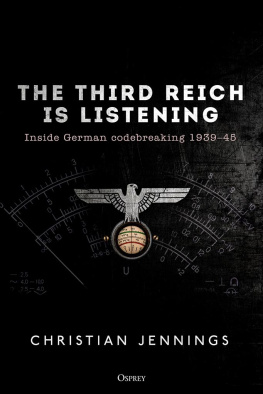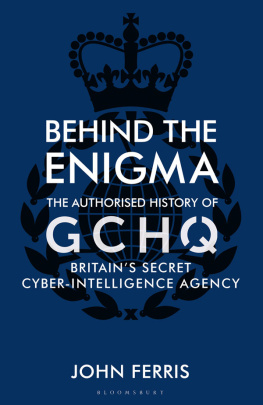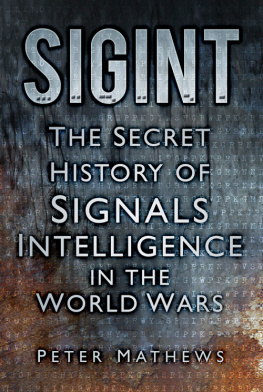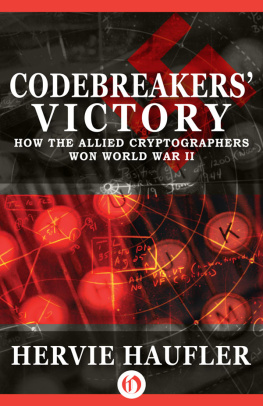ROUTLEDGE LIBRARY EDITIONS:
INTERNATIONAL SECURITY STUDIES
Volume 2
CODEBREAKING AND SIGNALS INTELLIGENCE
CODEBREAKING AND SIGNALS INTELLIGENCE
Edited by
CHRISTOPHER ANDREW
First published in 1986 by Frank Cass and Company Limited
This edition first published in 2021
by Routledge
2 Park Square, Milton Park, Abingdon, Oxon OX14 4RN
and by Routledge
52 Vanderbilt Avenue, New York, NY 10017
Routledge is an imprint of the Taylor & Francis Group, an informa business
1986 Frank Cass & Co. Ltd
All rights reserved. No part of this book may be reprinted or reproduced or utilised in any form or by any electronic, mechanical, or other means, now known or hereafter invented, including photocopying and recording, or in any information storage or retrieval system, without permission in writing from the publishers.
Trademark notice: Product or corporate names may be trademarks or registered trademarks, and are used only for identification and explanation without intent to infringe.
British Library Cataloguing in Publication Data
A catalogue record for this book is available from the British Library
ISBN: 978-0-367-68499-0 (Set)
ISBN: 978-1-00-316169-1 (Set) (ebk)
ISBN: 978-0-367-70875-7 (Volume 2) (hbk)
ISBN: 978-0-367-70879-5 (Volume 2) (pbk)
ISBN: 978-1-00-314832-6 (Volume 2) (ebk)
Publishers Note
The publisher has gone to great lengths to ensure the quality of this reprint but points out that some imperfections in the original copies may be apparent.
Disclaimer
The publisher has made every effort to trace copyright holders and would welcome correspondence from those they have been unable to trace.
CODEBREAKING AND SIGNALS INTELLIGENCE
Edited by
Christopher Andrew
First published 1986 in Great Britain by
FRANK CASS AND COMPANY LIMITED
Gainsborough House, 11 Gainsborough Road,
London E11 IRS, England
and in the United States of America by
FRANK CASS AND COMPANY LIMITED
c/o Biblio Distribution Center,
81 Adams Drive, P.O. Box 327, Totawa, NJ 07511
Copyright 1986 Frank Cass & Co. Ltd
Codebreaking and signals intelligence.
(Intelligence and national security; 1)
1. CryptographyHistory
I. Andrew, Christopher H. II. Series
355.3432 UB290
ISBN 0-7146-3299-6
This group of studies first appeared in a Special Issue on Code-breaking and National Security of the journal Intelligence and National Security, Vol. 1, No. 1, published by Frank Cass and Co. Ltd.
All rights reserved. No part of this publication may be reproduced, stored in a retrieval system or transmitted in any form or by any means, electronic, mechanical, photocopying, recording or otherwise, without prior permission of Frank Cass and Company Limited.
Printed in Great Britain by Specialised Printing Services Ltd, Lough ton, Essex
Contents
Notes on Contributors
Christopher Andrew
Tsarist Codebreakers and British Codes
Christopher Andrew and Keith Neilson
No Final Solution: A Survey of the Cryptanalytical Capabilities of German Military Agencies, 1926-35
J. W. M. Chapman
The Government Code and Cypher School Between the Wars
A. G. Denniston
From Polish Bomba to British Bombe: The Birth of Ultra
Gordon Welchman
Ultras Poor Relations
Chistopher Morris
Surveillance and Intelligence under the Vichy Regime: The Service du Controle Technique, 1939-45
Roger Austin
Dr Christopher Andrew is Fellow and Senior Tutor of Corpus Christi College, Cambridge. His most recent books are The Missing Dimension: Governments and Intelligence Communities in the Twentieth Century, in collaboration with David Dilks (London: Macmillan; Champaign, Illinois: University of Illinois Press, 1984) and Secret Service: The Making of the British Intelligence Community (London: Heinemann, 1985; for publication in New York by Viking early in 1986). He has written and broadcast on a variety of other historical subjects ranging from the French overseas empire to association football.
Dr Roger Austin is Lecturer in Education (History) at the University of Ulster at Coleraine. He is co-editor (with Roderick Kedward) of Vichy France and the Resistance: Culture and Ideology (London: Croom Helm, 1985) and the author of several articles on modern French history.
Dr John W. M. Chapman is Lecturer in International Relations at the University of Sussex. His research interests include both Asian and European contemporary history. He is the author of The Price of Admiralty: The War Diary of the German Naval Attache in Japan, 1939-1943 (Ripe, Sussex: Saltire Press; Vol.1: 1982; Vol.11: 1984).
The late A.G. Alastair Denniston CBE, CMG (1881-1961) taught modern languages at Osborne Naval College and also played hockey for Scotland before the First World War. In 1914 he became one of the first recruits to Room 40 OB, the cryptanalytical unit in the Admiralty. From 1919 to 1942 he was head of the Government Code and Cypher School. After leaving Bletchley Park in 1942, he headed a civil cryptanalytical unit in London until his retirement in 1945.
Christopher Morris is now retired after many years teaching history at Kings College, Cambridge, of which he is a Fellow. During the Second World War he worked at Bletchley Park on German naval ciphers. His publications cover a wide historical span from Plato to Montesquieu and from Shakespeares politics to bubonic plague. His most recent book is a new edition of The Illustrated Journeys of Celia Fiennes (London: Macdonald, 1982).
Dr Keith Neilson is Assistant Professor in the Department of History at the Royal Military College of Canada, Kingston, Ontario. He is the author of Strategy and Supply: The Anglo-Russian Alliance (London: Allen & Unwin, 1984) and of a number of articles on modern British and Russian history.
Gordon Welchman was lecturer in Mathematics at Cambridge University and Fellow of Sidney Sussex College before the Second World War. During the War he played a key role in the work of Bletchley Park which he describes in his book The Hut Six Story: Breaking the Enigma Codes (London: Allen Lane; New York: McGraw-Hill, 1982). He is now a US citizen.
CHRISTOPHER ANDREW
This collection of essays is mainly devoted to the most important form of twentieth-century intelligence gathering before the emergence of the spy satellite: signals intelligence (sigint) derived from various technologies of interception and the work of codebreakers and cryptanalysts. The final article, however, is a reminder of the continued importance of much more traditional forms of message interception. The ancient, if often dubious, art of the letter-opener still survives in an intelligence era increasingly dominated by ever more sophisticated means of technical collection.







